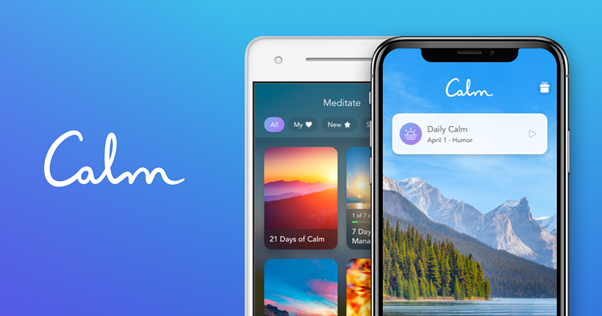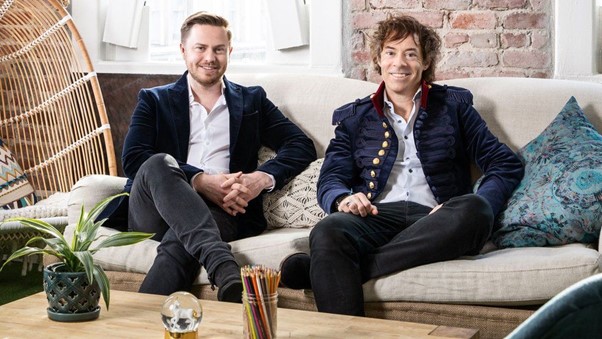What’s in a name? Stay calm and build a brand.

What’s in a name? Well, if it’s the right name it could be the basis for a brand valued at over $2billion.
For Michael Acton Smith and Alex Tew, both of whom have previous when it comes to start-ups, it was a name that was to prove the inspiration for their next big thing – Calm.
And big it is. More than 100 million people now have Calm, after a huge surge in downloads during the early days of the coronavirus pandemic.
It is a brand that seems to have been built on a mass of contractions; it delivers an ancient practice via that essential tool of modern life your smartphone, it is a tension busting app on a piece of technology that causes huge amounts of anxiety, it is a highly active and rapidly growing start-up that sells doing nothing.
Prior to co-founding Calm, Michael Acton Smith was perhaps most famous for an online game called Moshi Monsters which caught on caught with a mere 80 million kids. However just as he was dreaming of becoming the next Disney, user-growth stopped almost overnight. As Acton Smith later told Inc; “It was a really humbling, painful lesson.”
Alex Tew was famous for a site called the Million Dollar Homepage which he built to help finance his business-management degree while a student at Nottingham University.
The idea was to sell blocks of a home page that consisted of a million pixels. The cost was $1 per pixel and they were sold in 10 × 10 blocks. Purchasers then provided tiny images to be displayed on these blocks and a slogan that would be displayed when anyone hovered over their block with their cursor. The final 1,000 pixels were put up for auction on eBay and went for $38,100, which meant the final total was $1,037,100.
Tew however dropped out of the course after just one term.
The two were introduced at a party on a houseboat on the Thames. Acton Smith recalls “I remember reading about the Million Dollar Homepage and thinking, Wow, this chap is either incredibly obnoxious or a genius.”
Clearly it was the latter, as they ended up becoming roommates in London’s Soho. There they would play video games and swap on business ideas.
It was during this period that the pair heard that the domain name calm.com was coming up for auction and as Acton Smith puts it “We saw it and thought, Wow, what a domain!” and immediately they started wondering “Should we try and buy it? We can build the world’s most incredible brand.”
Tew was already a dedicated meditator. It is something that he says helped him manage the stresses and strains of founding and running a business.
Acton Smith was a more sceptical. “I didn’t really understand it,” he said. “It just felt a bit weird and strange, and I thought it had religious connotations.” For him it was a bit “woo-woo.”
However, under ‘pressure’ from Tew, he started reading around the subject, and became a convert “Wow, this is actually neuroscience. This is a way of rewiring the human brain. It’s one of the most valuable skills for Western society.”

Studies show that as little as 10 minutes of daily meditation lowers blood pressure and cortisol levels, while improving mood and reducing the incidence of anxiety and depression. It makes people more focused, more self-aware, more resilient, and happier too.
Not surprisingly the pair translated this as a brand whose aim is to help people “Find their Calm” and they adopted a mission “to make the world happier and healthier.”
The two bought the domain name for less than the $1 million its owner wanted, though they decline to say just how much they did pay for it.
Tew built a few early versions and moved to California in 2011 to try and take advantage of its large pool of investors and engineering talent, not to mention an audience they felt would be open to its claims and willing to pay for. Acton Smith joined Tew in California a few years later.
Calm was launched as a website in 2012 and the app in early 2013.
Its success is in part down to an approach that makes meditation simple, accessible, friendly and not overly spiritual. It avoids using any Buddhist terminology.

Now it’s looking to build on its success. It is producing products including books, films, puzzles, meditation cushions, and weighted blankets. It is expanding into corporate partnerships, offering meditations on American Airlines and in UK Uber rides. Corporate partners include GE and 3M.
It even has ambitions to move into hospitality. There is a plan for an island retreat “We were inspired by Richard Branson buying Necker Island all those years ago,” Acton Smith says. A second inspiration is a more accessible one and one Acton Smith has previously aspired to emulate – Disney with its theme parks.
And the moral is names don’t always come after the idea for a new brand, they can be a source of inspiration. Pick a name you would love to own and think what brand you would create under it.